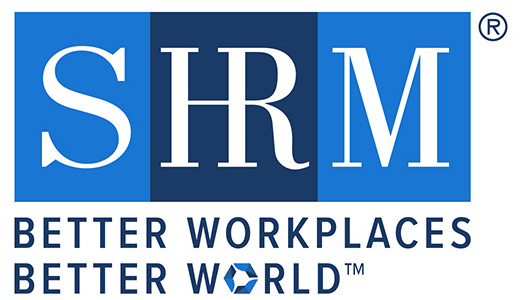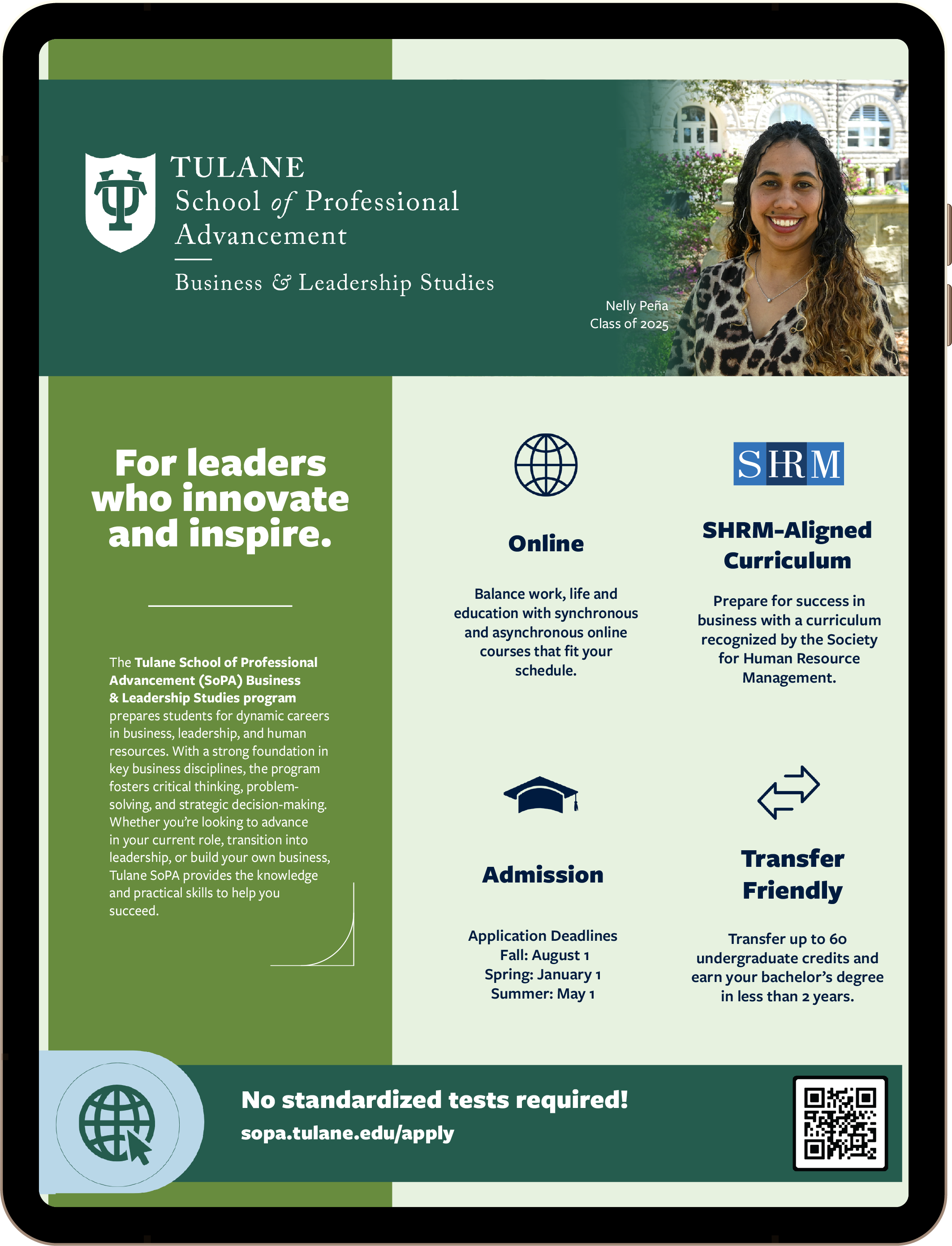Business & Leadership Studies
Request Information
By submitting this form, you agree to receive information about the Tulane School of Professional Advancement’s programs via email, phone and/or text. You may opt out at any time.

Business & Leadership Studies
The Business and Leadership Program at Tulane SoPA is a dynamic pathway to personal and professional success. A comprehensive understanding of business principles coupled with effective leadership skills is a powerful combination in today's competitive landscape. This program imparts critical knowledge in areas like strategic management, finance, and organizational behavior, while simultaneously honing leadership qualities such as communication and decision-making. Students will learn to navigate challenges, inspire teams, and drive positive organizational change, making it an invaluable investment for a dynamic and impactful career.

Affordable
Tuition

No Test
Scores

Rolling
Admission

Multiple
Start Dates

Expert
Faculty
Degrees & Certificates
Online Bachelor's Degrees
- Develop a specialty for strategic organizational design in the workplace. Students explore the impacts of employee recruitment, retention, and engagement as well as the ever-changing landscape of a post-covid workforce.
- 36 credit hours toward major, 84 credit hours general courses and electives. Find degree-specific information here.
- Study the foundations of business, organizational behavior, and principles of management.
- 36 credit hours toward major, 84 credit hours general courses and electives. Find degree-specific information here.
Professional Certificates
- This 18-credit certificate provides a foundation in the essential practices of accounting including processes, laws of taxation, and the ethical constructs for business relationships.
- View certificate requirements.
- This 18-credit certificate provides the analytical and practical skills that will help you to operate your business profitably, ethically, and successfully.
- View certificate requirements.
- In 18-credit hours you’ll grow your knowledge of forecasting, planning, recruiting, compensating, and managing human resources in compliance with applicable laws and ethical concepts.
- View certificate requirements.
- This 18-credit hour certificate offers experience in creating business plans, marketing strategies, and managing your endeavors successfully.
- View certificate requirements.
Visit our Frequently Asked Questions page to learn more about our programs and degrees.
Earning a degree or certificate through Tulane SoPA’s Business and Leadership Studies Program prepares you to target key areas needed to manage a business entity. Our programs cover everything from marketing to client relationship development, which can help you succeed in management or other leadership roles. These courses will not satisfy requirements toward majors in Tulane's School of Liberal Arts or the A.B. Freeman School of Business.

SoPA Student Spotlight
"SoPA not only paved the foundation for my educational journey, but provided me with real world experiences to prepare me for my future career endeavors."
Coty Perossier
Tulane SoPA class of 2014
Expert Faculty
Our faculty are experts who practice what they teach. By day, our professors are leaders in banking and finance, the legal industry, small business administration, human resources, and the hospitality industry. They bring their daily experience to the classroom to ensure you are learning real-world professional skills to further your career.

SoPA Faculty Feature
“I want my students to master the effective management of people by aligning both organizational and individual success, as there is nothing more rewarding than achieving this harmony. This balance defines true leadership.”
Ambika Prasad, Ph.D.
Business & Leadership Studies
Associate Director & Professor of Practice

Society for Human Resource Management (SHRM)
Students enrolled in SoPA’s bachelor’s degree program in Human Resources are learning from a SHRM-approved HR curriculum aligned with today’s HR standards. You’ll learn the ins and outs of organizational leadership including:
- Compensation and benefits
- Recruiting and staffing
- Training and retention
Engaging & Flexible Student Experience, On-Campus & Online
Partnerships that translate into industry certifications, credit for experience, & career advancement opportunities.
Never watch a boring PowerPoint. We’ve developed the most interactive courses around.
Our courses are constantly refreshed and informed by what leaders in business and HR fields expect from graduates.
Navigate degree requirements and prepare for the workforce with help from our academic advisors and career counselor.
Meet the Advisory Board
The Business and Leadership Studies curriculum is guided by experienced faculty and a knowledgeable advisory board that helps ensure the most up-to-date and relevant skillsets are being taught to our students.
Featured Members
- President, Mississippi Gulf Coast at Trustmark National Bank
- Director - Security Services, University of Pennsylvania
- Banker, J.P. Morgan Private Bank
- Senior Professor of Practice, A.B. Freeman School of Business
Facts at a Glance
Tulane SoPA accepts students on a rolling basis, year-round. Start dates every August, January, and May. We never require test scores or recommendations. Visit our Admissions Process page to learn more.
All tuition is charged by the credit hour and we have minimal fees. Visit our tuition page to see our current tuition rates and use our net price calculator.
We strive to make a Tulane SoPA education affordable for all students. Learn about financial aid, discounts and scholarship opportunities here.
Earn credit for your work experience through a portfolio assessment. Undergraduates can earn up to 24 portfolio credits. Graduate students can earn up to 6 portfolio credits.
SoPA offers career advising to all enrolled students.

Enter your email to download our Business & Leadership Studies e-brochure.
By submitting this form, you agree to receive information about the Tulane School of Professional Advancement’s programs via email, phone and/or text. You may opt out at any time.












